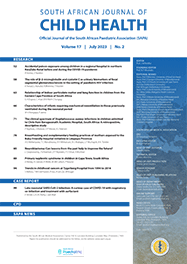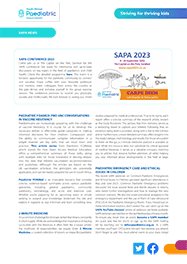Research

Breastfeeding support practices in designated workplaces in the Breede Valley sub-district, Western Cape, South Africa
Abstract
Background. Globally, mothers have identified employment as one of the leading barriers to exclusive and continued breastfeeding. The workplace and employment setting has been highlighted as one component of an enabling environment for breastfeeding.
Objectives. To assess breastfeeding support practices in designated workplaces in the Breede Valley sub-district, Western Cape, South Africa.
Methods. A quantitative, cross-sectional design study was used. An online survey was conducted amongst human resource managers and/or company managers to determine breastfeeding support practices in designated workplaces.
Results. Fourteen participants completed the online survey. Breastfeeding support practices in designated workplaces were limited and inadequate, with few supportive breastfeeding practices. Onsite or nearby crèche facilities (n=2; 14.3%), breastfeeding counsellors (n=1; 7.1%), promotion of the benefits of breastfeeding to employees (n=2; 14.3%) and provision of private space for expressing (n=2; 14.3%) were not common practices. Workplace breastfeeding policies (n=4; 28.6%) were not common practice, and were mostly found in the public sector. Forty-three percent of workplaces (n=6; 42.9%) did not provide time for expressing at work.
Conclusion. There is an urgent need to create advocacy regarding the benefits of breastfeeding support in the workplace for employers, employees and society as well as the breastfeeding rights of women in the workplace. The legislated breastfeeding break times need to be monitored to ensure better compliance in workplaces.
Authors' affiliations
L Daniels, Division of Human Nutrition, Department of Global Health, Faculty of Medicine and Health Sciences, Stellenbosch University, Cape Town, South Africa
L M Du Plessis, Division of Human Nutrition, Department of Global Health, Faculty of Medicine and Health Sciences, Stellenbosch University, Cape Town, South Africa
X Mbhenyane, Division of Human Nutrition, Department of Global Health, Faculty of Medicine and Health Sciences, Stellenbosch University, Cape Town, South Africa
Full Text
Cite this article
Article History
Date published: 2020-07-07
Article Views
Full text views: 986

.jpg)



Comments on this article
*Read our policy for posting comments here